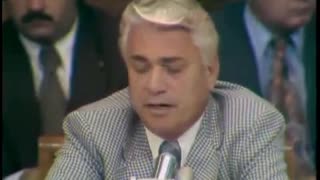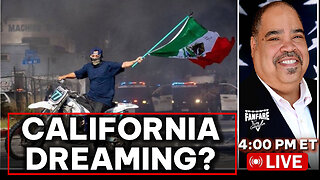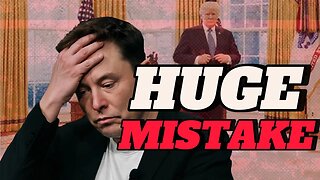Premium Only Content

Watergate Hearings Day 33: H.R. Haldeman (1973-08-01)
The dark side of history: https://thememoryhole.substack.com/
Harry Robbins "Bob" Haldeman (October 27, 1926 – November 12, 1993) was an American political aide and businessman, best known for his service as White House Chief of Staff to President Richard Nixon and his consequent involvement in the Watergate scandal.
Born in California, Haldeman served in the Navy Reserves in World War II and attended UCLA. In 1949, he joined the J. Walter Thompson advertising agency, where he worked for 20 years as a prominent advertising executive in both Los Angeles and New York City. He made a name for himself early in Los Angeles social circles from his work as chairman of the UCLA Alumni Association and a member of the University of California Board of Regents.
A long family association with the Republican Party and his own interest drew Haldeman to politics. In the 1950s, he became acquainted with Nixon, for whom he developed both an intense respect and steadfast loyalty. He began as an advance man on President Dwight D. Eisenhower's reelection campaign in 1956, again worked as an advance man on Nixon's 1960 presidential campaign, and managed Nixon's 1962 run for governor of California. When Nixon was elected President in 1968, he selected Haldeman as his chief of staff.
Haldeman is credited with implementing more significant changes to White House staffing systems and Executive Branch governance and operations than any chief of staff before him or since, and it is the "Haldeman system" that presidential administrations continue to operate on today. His intensity and no-nonsense management style earned him a reputation as a stern taskmaster who expected top-notch performance.[1]
After he left the Nixon administration in April 1973, Haldeman was tried on counts of perjury, conspiracy, and obstruction of justice for his role in the Watergate cover-up. He was found guilty and imprisoned for 18 months. Upon Haldeman's release, he returned to private life and was a successful businessman and real estate developer until his death from cancer in 1993 at the age of 67.
The White House chief of staff is the head of the Executive Office of the President of the United States, a cabinet position in the federal government of the United States.
The chief of staff is a political appointee of the president of the United States who does not require Senate confirmation, and who serves at the pleasure of the President. While not a legally required role, all presidents since Harry S. Truman have appointed a chief of staff.
In the administration of Joe Biden, the current chief of staff is Jeff Zients, who succeeded Ron Klain on February 8, 2023. The chief of staff is the most senior political appointee in the White House. The position is widely recognized as one of great power and influence, owing to daily contact with the president of the United States and control of the Executive Office of the President of the United States.
Historical background
Originally, the duties now performed by the chief of staff belonged to the president's private secretary and were fulfilled by crucial confidantes and policy advisers such as George B. Cortelyou, Joseph Tumulty, and Louis McHenry Howe to presidents Theodore Roosevelt, Woodrow Wilson, and Franklin Roosevelt, respectively.[1] The private secretary served as the president's de facto chief aide, in a role that combined personal and professional assignments of highly delicate and demanding natures, requiring great skill and utmost discretion.[2] The job of gatekeeper and overseeing the president's schedule was separately delegated to the appointments secretary, as with aide Edwin "Pa" Watson.[3]
From 1933 to 1939, as he greatly expanded the scope of the federal government's policies and powers in response to the Great Depression, President Franklin D. Roosevelt relied on his famous 'Brain Trust' of top advisers. Although working directly for the president, they were often appointed to vacant positions in federal agencies and departments, whence they drew their salaries since the White House lacked statutory or budgetary authority to create staff positions. It was not until 1939, during Roosevelt's second term in office, that the foundations of the modern White House staff were created using a formal structure. Roosevelt was able to persuade Congress to approve the creation of the Executive Office of the President, which would report directly to the president. During World War II, Roosevelt created the position of "Chief of Staff to the Commander-in-Chief" for his principal military adviser, Fleet Admiral William D. Leahy.[citation needed]
In 1946, in response to the rapid growth of the U.S. government's executive branch, the position of "Assistant to the President of the United States" was established. Charged with the affairs of the White House, it was the immediate predecessor to the modern chief of staff. It was in 1953, under Republican President Dwight D. Eisenhower, that the president's preeminent assistant was designated the "White House Chief of Staff".[citation needed]
Assistant to the president became a rank generally shared by the chief of staff along with the other most senior presidential aides such as the White House counsel, the White House press secretary, and others. This new system did not catch on immediately however. Presidents Kennedy and Johnson still relied on their appointments secretaries instead, and it was not until the Nixon administration that the chief of staff took over maintenance of the President's schedule. This concentration of power in the Nixon and Ford White House (whose last chief of staff was Dick Cheney) led presidential candidate Jimmy Carter to campaign in 1976 with the promise that he would not appoint a chief of staff. And indeed, for the first two and a half years of his presidency, he appointed no one to the post.[4][5]
Average tenure in office
The average tenure for a White House chief of staff is a little more than 18 months.[6] The inaugural chief of staff, John R. Steelman, under Harry S. Truman, was the president's only chief of staff; Kenneth O'Donnell alone served in the position during John F. Kennedy's unfinished term of 34 months in office. Andrew Card and Denis McDonough each served at least one entire presidential term of office under presidents George W. Bush and Barack Obama, respectively.[citation needed]
Role
Chris Whipple, author of The Gatekeepers: How the White House Chiefs of Staff Define Every Presidency, loosely describes the role of a White House chief of staff through his interview with former president Barack Obama:
"During the last days of his presidency, Barack Obama observed: 'One of the things I've learned is that the big breakthroughs are typically the result of a lot of grunt work—just a whole lot of blocking and tackling.' Grunt work is what chiefs of staff do."[6]
— Chris Whipple
The responsibilities of the chief of staff are both managerial and advisory and may include the following:
Selecting senior White House staffers and supervising their offices' activities;
Managing and designing the overall structure of the White House staff system;
Control the flow of people into the Oval Office;
Manage the flow of information to and decisions from the Resolute Desk (with the White House staff secretary);
Directing, managing and overseeing all policy development;
Protecting the political interests of the president;
Negotiating legislation and appropriating funds with United States Congress leaders, Cabinet secretaries, and extra-governmental political groups to implement the president's agenda; and
Advise on any and usually various issues set by the president.[6]
These responsibilities have recently extended to firing of senior staff members. In the case of Omarosa Manigault Newman, who published a tape she alleged was made in the Situation Room of her firing by Chief of Staff John Kelly, the chief of staff said that his decision for her departure was non-negotiable and that "the staff and everyone on the staff works for me and not the president."[7]
Richard Nixon's first chief of staff, H. R. Haldeman, garnered a reputation in Washington for the iron hand he wielded in the position—famously referring to himself as "the president's son-of-a-bitch", he was a rigid gatekeeper who would frequently meet with administration officials in place of the president, and then report himself to Nixon on the officials' talking points. Journalist Bob Woodward, in his books All the President's Men (1974) and The Secret Man (2005), wrote that many of his sources, including Mark Felt, later revealed as "Deep Throat", displayed a genuine fear of Haldeman.[8][9]
List of White House chiefs of staff
No. Portrait Name Took office Left office Time in office Party President
1
John Steelman
John Steelman
(1900–1999) December 12, 1946 January 20, 1953 6 years, 39 days Democratic Harry S Truman
2
Sherman Adams
Sherman Adams
(1899–1986) January 20, 1953 October 7, 1958 5 years, 260 days Republican Dwight D. Eisenhower
3
Wilton Persons
Wilton Persons
(1896–1977) October 7, 1958 January 20, 1961 2 years, 105 days Republican Dwight D. Eisenhower
–
Kenneth O'Donnell
Kenneth O'Donnell
(1924–1977)
[a] January 20, 1961 November 22, 1963 2 years, 306 days Democratic John F. Kennedy
–
Walter Jenkins
Walter Jenkins
(1918–1985)
[a] November 22, 1963 October 14, 1964 327 days Democratic Lyndon B. Johnson
–
Bill Moyers
Bill Moyers
(born 1934)
[a] October 14, 1964 July 8, 1965 267 days Democratic Lyndon B. Johnson
–
Jack Valenti
Jack Valenti
(1921–2007)
[a] July 8, 1965 June 1, 1966 328 days Democratic Lyndon B. Johnson
–
Marvin Watson
Marvin Watson
(1924–2017)
[a] June 1, 1966 April 26, 1968 1 year, 330 days Democratic Lyndon B. Johnson
–
James R. Jones
James R. Jones
(born 1939)
[a] April 26, 1968 January 20, 1969 269 days Democratic Lyndon B. Johnson
4
H. R. Haldeman
H. R. Haldeman
(1926–1993) January 20, 1969 April 30, 1973 4 years, 100 days Republican Richard Nixon
Vacant
April 30, 1973 – May 4, 1973 (4 days)
5
Alexander Haig
Alexander Haig
(1924–2010) May 4, 1973 September 21, 1974 1 year, 140 days Republican Richard Nixon
Gerald Ford
6
Donald Rumsfeld
Donald Rumsfeld
(1932–2021) September 21, 1974 November 20, 1975 1 year, 60 days Republican Gerald Ford
7
Dick Cheney
Dick Cheney
(born 1941) November 20, 1975 January 20, 1977 1 year, 61 days Republican Gerald Ford
Vacant
January 20, 1977 – July 18, 1979 (2 years, 179 days)
8
Hamilton Jordan
Hamilton Jordan
(1944–2008) July 18, 1979 June 11, 1980 329 days Democratic Jimmy Carter
9
Jack Watson
Jack Watson
(born 1938) June 11, 1980 January 20, 1981 223 days Democratic Jimmy Carter
10
James Baker
James Baker
(born 1930) January 20, 1981 February 4, 1985 4 years, 15 days Republican Ronald Reagan
11
Donald Regan
Donald Regan
(1918–2003) February 4, 1985 February 27, 1987 2 years, 23 days Republican Ronald Reagan
12
Howard Baker
Howard Baker
(1925–2014) February 27, 1987 July 1, 1988 1 year, 125 days Republican Ronald Reagan
13
Kenneth Duberstein
Kenneth Duberstein
(1944–2022) July 1, 1988 January 20, 1989 203 days Republican Ronald Reagan
14
John Sununu
John Sununu
(born 1939) January 20, 1989 December 16, 1991 2 years, 330 days Republican George H. W. Bush
15
Samuel Skinner
Samuel Skinner
(born 1938) December 16, 1991 August 23, 1992 251 days Republican George H. W. Bush
16
James Baker
James Baker
(born 1930) August 23, 1992 January 20, 1993 150 days Republican George H. W. Bush
17
Mack McLarty
Mack McLarty
(born 1946) January 20, 1993 July 17, 1994 1 year, 178 days Democratic Bill Clinton
18
Leon Panetta
Leon Panetta
(born 1938) July 17, 1994 January 20, 1997 2 years, 187 days Democratic Bill Clinton
19
Erskine Bowles
Erskine Bowles
(born 1945) January 20, 1997 October 20, 1998 1 year, 273 days Democratic Bill Clinton
20
John Podesta
John Podesta
(born 1949) October 20, 1998 January 20, 2001 2 years, 92 days Democratic Bill Clinton
21
Andrew Card
Andrew Card
(born 1947) January 20, 2001 April 14, 2006 5 years, 84 days Republican George W. Bush
22
Joshua Bolten
Joshua Bolten
(born 1954) April 14, 2006 January 20, 2009 2 years, 281 days Republican George W. Bush
23
Rahm Emanuel
Rahm Emanuel
(born 1959) January 20, 2009 October 1, 2010 1 year, 254 days Democratic Barack Obama
–
Pete Rouse
Pete Rouse
(born 1946)
Acting
[b] October 1, 2010 January 13, 2011 104 days Democratic Barack Obama
24
Bill Daley
Bill Daley
(born 1948) January 13, 2011 January 27, 2012 1 year, 14 days Democratic Barack Obama
25
Jack Lew
Jack Lew
(born 1955) January 27, 2012 January 20, 2013 359 days Democratic Barack Obama
26
Denis McDonough
Denis McDonough
(born 1969) January 20, 2013 January 20, 2017 4 years, 0 days Democratic Barack Obama
27
Reince Priebus
Reince Priebus
(born 1972) January 20, 2017 July 31, 2017 192 days Republican Donald Trump
28
John F. Kelly
John F. Kelly
(born 1950) July 31, 2017 January 2, 2019 1 year, 154 days Independent Donald Trump
–
Mick Mulvaney
Mick Mulvaney
(born 1967)
Acting January 2, 2019 March 31, 2020 1 year, 89 days Republican Donald Trump
29
Mark Meadows
Mark Meadows
(born 1959) March 31, 2020 January 20, 2021 295 days Republican Donald Trump
30
Ron Klain
Ron Klain
(born 1961) January 20, 2021 February 7, 2023 2 years, 18 days Democratic Joe Biden
31
Jeff Zients[10]
Jeff Zients[10]
(born 1966) February 8, 2023 Incumbent 316 days Democratic Joe Biden
See also
Chief of staff
White House Deputy Chief of Staff
Chief of Staff to the Vice President of the United States
Officer of the United States
Staff and line
Notes
De facto
Pete Rouse served as ad interim White House Chief of Staff following the resignation of Rahm Emanuel and until the appointment of Bill Daley.
References
"New Quarters". Time. December 17, 1934. Archived from the original on January 20, 2009. Retrieved May 8, 2008.
"An Appointment". Time. August 20, 1923. Archived from the original on December 22, 2008. Retrieved May 9, 2009.
Hassett, William D. (1958). Off The Record With FDR 1942–1945. Chicago, Illinois: Rutgers University Press. p. 36. Retrieved May 9, 2009.
"Hamilton Jordan, Carter's Right Hand, Dies at 63". The New York Times. May 21, 2008. Retrieved March 7, 2016.
Michael Nelson (2013). The Presidency and the Political System. SAGE Publications. p. 351. ISBN 9781483322896. Retrieved March 7, 2016.
Whipple, Chris. (2017). The Gatekeepers: How the White House Chiefs of Staff Define Every Presidency. New York: Crown Publishing Group.
"Transcript". CNN. August 13, 2018.
Woodward, Bob; Bernstein, Carl. (1974) All the President's Men. New York: Simon & Schuster. ISBN 978-0-671-21781-5
Woodward, Bob. (2005). The Secret Man. New York: Simon & Schuster. ISBN 0-7432-8715-0
Phil Mattingly; Kaitlan Collins (January 22, 2023). "Jeff Zients to replace Ron Klain as White House chief of staff". CNN. Retrieved January 22, 2023.
vte
White House Chiefs of Staff
Steelman Adams Persons O'Donnell Jenkins Moyers Valenti M. Watson Jones Haldeman Haig Rumsfeld Cheney Jordan J. Watson J. Baker Regan H. Baker Duberstein Sununu Skinner J. Baker McLarty Panetta Bowles Podesta Card Bolten Emanuel Rouse Daley Lew McDonough Priebus Kelly Mulvaney Meadows Klain Zients
vte
Executive Office of the United States President
Executive Office
Advisory Boards (Council for Community Solutions, Corporation for National and Community Service, Initiative on Asian Americans and Pacific Islanders, President's Council of Advisors on Science and Technology, President's Intelligence Advisory Board, President's Management Advisory Board) Council of Economic Advisers Council on Environmental Quality Digital Service Executive Residence (Committee for the Preservation of the White House, Office of the Curator, Office of the Chief Usher, Office of the Chief Floral Designer, Office of the Executive Chef, Graphics and Calligraphy Office) National Space Council National Security Council (Deputies Committee) Homeland Security Council Office of Administration (Office of Mail and Messenger Operations, Office of the Chief Financial Officer, Office of the Chief Administrative Officer) Office of Management and Budget (Office of the Chief Performance Officer, Office of E-Government and Information Technology, Office of Federal Financial Management, Office of Information and Regulatory Affairs) Office of National Drug Control Policy Office of Science and Technology Policy (Office of the Chief Technology Officer, National Science and Technology Council) Office of the Trade Representative Office of the Vice President (Office of the Chief of Staff)
White House Office
Office of Cabinet Affairs Office of the Chief of Staff (Office of Senior Advisors) Office of Communications (Office of Media Affairs, Office of Research, Office of the Press Secretary, Office of Speechwriting) Counsel Counselor to the President Office of Digital Strategy Domestic Policy Council (Office of Faith-Based and Neighborhood Partnerships, Office of National AIDS Policy, Office of Social Innovation and Civic Participation, Rural Council) Fellows First Lady (Office of the Social Secretary) Office of the National Security Advisor (Homeland Security Advisor) Gun Violence Prevention Intergovernmental Affairs Legislative Affairs Management and Administration (White House Operations, White House Personnel, Visitors Office) National Economic Council National Trade Council Oval Office Operations (Personal Secretary) Office of Political Affairs Presidential Innovation Fellows Presidential Personnel Public Engagement (Council on Women and Girls, Jewish Liaison, Urban Affairs) Scheduling and Advance Staff Secretary (Executive Clerk, Presidential Correspondence, Office of Records Management) Military Office (Communications Agency, Medical Unit, Presidential Food Service, Transportation Agency)
vte
White House Office
American Innovation Cabinet Affairs Chief of Staff Communications Counsel Counselor Fellows First Lady
Executive Chef Floral Designer Social Secretary Gun Violence Prevention Intergovernmental Affairs Legislative Affairs Management and Administration Oval Office Operations Political Affairs Presidential Personnel Press Secretary Public Liaison Scheduling and Advance Senior Advisor Staff Secretary Trade and Manufacturing Policy
Categories:
United States presidential advisorsWhite House OfficeExecutive Office of the President of the United StatesCabinet of the United StatesWhite House Chiefs of Staff
-
 6:37:17
6:37:17
The Memory Hole
4 months agoNixon Impeachment Hearings Day 6 (1974-07-29)
840 -
 LIVE
LIVE
IsaiahLCarter
4 hours agoAPOSTATE RADIO 017: Ranking Marxist Pluralities, with Seneca Scott
627 watching -
 LIVE
LIVE
Cavs_Arcade
1 hour agoWeekend Vibes! 🍺🍕 | RE4 Remake | #18 |
41 watching -
 2:08:10
2:08:10
Nerdrotic
3 hours ago $3.89 earnedMalaysian Flight MH370 and Zero Point Free Energy with Ashton Forbes | Forbidden Frontier #104
30K3 -
![Xenoblade Chronicles X: Definitive Edition Episode 28 [Sidequests + Ch 9] (The Variety Show DX #625)](https://1a-1791.com/video/fww1/1c/s8/1/L/O/y/R/LOyRy.0kob-small-Xenoblade-Chronicles-X-Defi.jpg) LIVE
LIVE
SirRank0
56 minutes agoXenoblade Chronicles X: Definitive Edition Episode 28 [Sidequests + Ch 9] (The Variety Show DX #625)
13 watching -
 4:19:57
4:19:57
Barry Cunningham
11 hours agoDO YOU KNOW WHAT IS HAPPENING IN CALIFORNIA MEANS TO THE REST OF AMERICA?
79.6K157 -
 LIVE
LIVE
EricJohnPizzaArtist
6 days agoAwesome Sauce PIZZA ART LIVE Ep. #50: Movie Night with JAWS!
69 watching -
 32:50
32:50
Stephen Gardner
3 hours ago🔥Elon Musk CAN'T UNDO this MISTAKE with Trump!
21.1K45 -
 LIVE
LIVE
SpartakusLIVE
3 hours agoSpecialist EASTER EGG at the Tower of Power || Duos w/ @sophiesnazz, Quads Later?!
176 watching -
 2:21:54
2:21:54
Anthony Rogers
3 hours agoTop 10 Takedowns on Fortnite
26.8K1